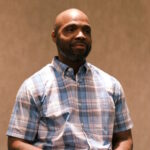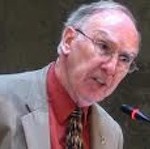The Tachmindji Event is one of the premier events of the Consortium, made possible by the vision of Diane Tachmindji. View more information about upcoming and past events below. The Event is dedicated to interreligious dialogue, currently focusing on interfaith dialogue and peacemaking.
View previous years’ event videos or read more by clicking the year: 2023 | … | 2019 | 2018 | 2017 | 2016 | 2015 | 2014 | 2013 | 2012 | 2011 or View prior event videos in this YouTube playlist.
2023:“Guilty” no More: The Innocence Project
 This year’s event highlighted the injustices which plague the U.S. incarceration system and the need for criminal legal reform. Imagine helping a woman under attack, being misperceived as the perpetrator, and being shot in the back by police. Then you are unjustly incarcerated for 19 years, only to be freed by lawyers from the Innocence Project. This is Mr. Termaine Hicks’ story. He spoke in November at the School of International Service of American University. The respondent was Rev. Dr. Harold Dean Trulear, Professor of Applied Theology at the Howard University School of Divinity.
This year’s event highlighted the injustices which plague the U.S. incarceration system and the need for criminal legal reform. Imagine helping a woman under attack, being misperceived as the perpetrator, and being shot in the back by police. Then you are unjustly incarcerated for 19 years, only to be freed by lawyers from the Innocence Project. This is Mr. Termaine Hicks’ story. He spoke in November at the School of International Service of American University. The respondent was Rev. Dr. Harold Dean Trulear, Professor of Applied Theology at the Howard University School of Divinity.
There is no video of this event.
PHOTO CREDIT: KENNY KARPOV/INNOCENCE PROJECT
2019: The Journey of a Former White Supremacist: The Power of Community to Effect Change
This story of three friends who met in college illustrates the incredible change that can take place, even for a deeply connected, former youth leader in the white supremacy movement. Panelists Matthew Stevenson, Allison Gornik, and R. Derek Black, including a former white supremacist leader, share their dramatic story of friendship and change.
Moderator: Dr. Marc Gopin, Director of the Center for World Religions, Diplomacy and Conflict Resolution at George Mason University
Following the presentation, audience members and panelists engaged in a question and answer session.
2018: Interfaith Encounters that Change Us: The Impact of Others’ Faith on Our Own
Our 2018 keynote was Rabbi Gerry Serotta on Community Based Dialogue Peacebuilding in the Metro area. He is Executive Director of the Interfaith Council of Metropolitan Washington. He was the Founder and Chair of Rabbis for Human Rights – North America, and he chaired the Board of Chaplains of George Washington University for many years.
Responding to Rabbi Serotta were Imam Yahya Hendi, Chaplain at Georgetown University, and Dr. Matthew Taylor, Protestant Scholar at the Institute for Islamic, Christian, and Jewish Studies.
2017: Seeds of Peace: Young Peacebuilders Across the Globe
This remarkable evening featured young peacebuilders from the “Seeds of Peace” organization, which inspires and cultivates new generations of global leaders in communities divided by conflict. Seeds of Peace encompasses 6,558 alumni throughout the Middle East, South Asia, Europe, and the United States. They equip exceptional youth and educators with the skills and relationships they need to accelerate social, economic, and political changes essential for peace. Panelists were Mr. Jabari, a Palestinian from Hebron and graduate student at Tufts University and Mr. Shapir, an Israeli from Haifa attending Brandeis University. Both were participants in the Seeds of Peace camp. The moderator was Aaron David Miller, Vice-President for New Initiatives and a Distinguished Fellow at the Woodrow Wilson International Center for Scholars, Washington, D.C. For two decades he served in the Department of State as an analyst, negotiator and adviser on Middle Eastern issues to Republican and Democratic Secretaries of State. From 2003-06 he served as president of Seeds of Peace.
(no video available for this event)
2016: Alternative Responses to Violent Extremism: Islamic Approaches to Peacebuilding
Our speaker was Dr. Mohammed Abu-Nimer, a Professor in the School of International Service at American University, and Founder and President of the Salam Institute for Peace and Justice.
The respondent to Dr. Abu-Nimer was special guest, Mr. Khizr Khan, Speaker at the Democratic National Convention, Lawyer, Community leader, and Gold Star father of American military hero, Captain Humayun Khan
2015: Refugees, Religious Communities and their Security:The Importance of Intercommunal Co-existence in the Middle East
Ms. Hind Kabawat, Director of Interfaith Peacebuilding at the Center for World Religions, Diplomacy, and Conflict Resolution (CDRC) at George Mason University, addressed the realities of refugees in the Middle East and the role religious communities play in attending to their needs in the 2015 lecture.
Following Ms. Kabawat’s lecture, a response was given by Dr. Marc Gopin, Director of the CDRC and James H. Laue Professor of World Religions, Diplomacy, and Conflict Resolution at George Mason University and there was some time for questions and answers from the audience.
2014: Christian-Jewish Reconciliation: The Unfinished Business
Dr. Joseph Montville of George Mason University reflected on this important and timely topic at American University in October 2014.
2013: Where Religion and Peacebuilding Meet National Security
In October 2013, Dr. Lisa Schirch, from the Center for Justice and Peacebuilding of Eastern Mennonite University addressed “Where Religion and Peacebuilding Meet National Security” through her story as a Mennonite and her experiences in the Middle East and Afghanistan. The audience included diplomats, policy makers, church leaders, educators and students in diplomacy and theological studies.
2012: Interfaith Paths to Peace
Dr. Marc Gopin addressed a diverse crowd of students, religious leaders,faculty, and public-minded laity on this topic in October 2012 at American University. Dr. Gopin spoke of “on the ground” peacemaking that keeps hope and progress alive.
2011: From the Age of Monologue to the Age of Global Dialogue
 Dr. Leonard Swidler addressed a diverse audience at Virginia Theological Seminary on this engaging topic.
Dr. Leonard Swidler addressed a diverse audience at Virginia Theological Seminary on this engaging topic.

